Oral Hygiene
What Is the Right Way to Brush my Teeth?
Proper brushing takes at least two minutes! Actually that is not so small as it sounds. Most adults do not really brush for 120 seconds. To feel what it means, try a stopwatch once in a while. To properly brush your teeth, use short, gentle strokes, paying attention to the gums, hard-to-reach back teeth, and areas around fillings, crowns or other restoration. Concentrate on thoroughly cleaning each section as follows:
- Clean the outer surfaces of your upper teeth, then your lower teeth.
- Clean the inner surfaces of your upper teeth, then your lower teeth.
- Massage your gums.
- For fresher breath, be sure to brush your tongue, too. Many toothbrushes now provide a specific surface to massage your gums and clean your tongue.

How do I select the Toothbrush I Should Use?
Most dentists suggest that a soft-bristled brush is best for removing plaque and debris from your teeth. Small-headed brushes can better reach all areas, including hard-to-reach back teeth. Nowadays, a powered toothbrush is a good alternative. It can do a better job of cleaning teeth, particularly for those who have difficulty brushing.
How do I select the Tooth paste that I Use?
It is important that you use a toothpaste that suits your requirements. There is a wide variety of toothpastes in the market that are designed for many conditions such as cavities, gingivitis, tartar, stained teeth, teeth sensitivity etc. Ask your dentist or hygienist for the toothpaste that will suit you best.
How Frequently Should I Replace My Toothbrush?
Toothbrush should be replaced when it begins to show wear, or every three months, whichever comes first. It is also advisable to change toothbrushes after you've had a cold, since the bristles can retain germs that leading to reinfection.
What Is Good Oral Hygiene?
Good oral hygiene aims for a mouth that looks and smells healthy, meaning thereby:
- Teeth clean and free of debris
- Pink Gums that do not hurt or bleed
- No Bad breath
If your gums hurt or bleed while brushing or flossing, or if you have persistent bad breath, you need to see your dentist. Your dentist can help you with good oral hygiene techniques and point out areas that may require extra attention during brushing and flossing.
How Is Good Oral Hygiene Practiced?
Maintaining good oral hygiene is one of the most important things you need to do for your dental health. Healthy teeth enable you to look and feel good, besides making it possible to eat and speak properly. Good oral health is important to your overall well-being.
Preventive care, with proper brushing and flossing, helps stop problems before they develop and is less painful, expensive, and worrisome than treating health conditions that may result due to bad Hygeine.
Simple steps that each of us can take to greatly decrease the risk of developing tooth decay, gum disease and other dental problems include:
- Brushing thoroughly twice a day and flossing daily .
- Eating a balanced diet .
- Using dental products that contain fluoride .
- Rinsing with a fluoride mouth rinse.
- Making sure that your children under 12 drink take a fluoride supplement if they live in a non-fluoridated area
What is the Right Way to Floss my Teeth?

Get In Touch
-
32 Diamonds Dental Clinic
-

11/4, 1st Floor, Rameshwer Tower,
Above Khanna Opticals ,Main Market,Vaishali, Sector-4, Ghaziabad-201010 (U.P.)
-

Mor.: 10.00 am to 1.30 pm
Eve.: 5.30 pm to 8.30 pm
(Tuesday Closed)

